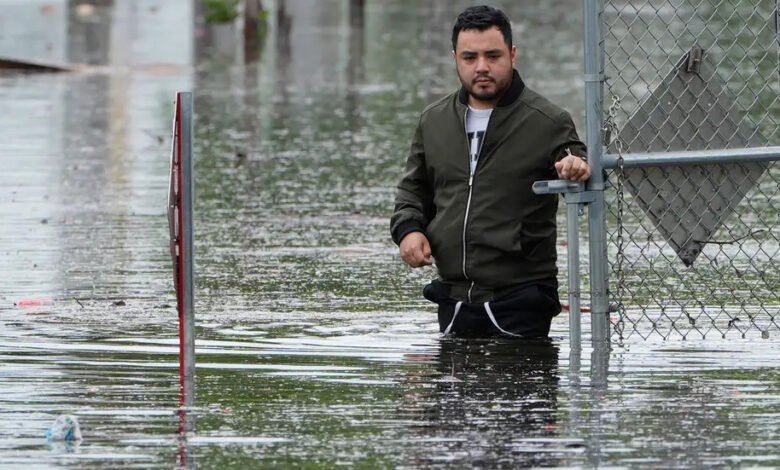Florida Flooding: Millions Under State of Emergency, Including Miami and Fort Lauderdale

Parts of Florida are currently grappling with severe flooding after unprecedented rainfall led to a state of emergency in five counties, including Miami-Dade and Broward. With up to 2 feet of rain recorded in some areas, cities like Miami, Fort Lauderdale, and Naples are experiencing significant disruptions. The flooding has caused chaos on the roads, led to hundreds of flight cancellations, and forced closures of schools and businesses.
The Extent of the Flooding
The deluge has resulted in submerged cars, flooded homes, and widespread chaos across the affected regions. Meteorologist Jonathan Erdman from weather.com explained that the severe weather was due to a persistent pattern of high pressure to the east and lower pressure to the west, which funneled a deep plume of moisture from Central America and the Caribbean into the Florida peninsula.
Key Rainfall Totals
- Broward County: Hallandale received 19.39 inches, Hollywood recorded 19.1 inches, Davie saw 17.97 inches, and Fort Lauderdale experienced 12.84 inches.
- Collier County: Big Cypress National Preserve was drenched with 25.13 inches of rain.
- Miami-Dade County: North Miami bore the brunt with 24 inches, while Miami Beach recorded 13.64 inches.
The Impact on Transportation and Daily Life
The flooding has severely impacted transportation, with many streets in Miami resembling scenes from a disaster movie, littered with abandoned and stalled vehicles. Tow truck driver Ted Rico described the chaos, noting, “There’s cars littered everywhere, on top of sidewalks, in the median, in the middle of the street, no lights on. Just craziness, you know. Abandoned cars everywhere.”
At Miami International Airport and Fort Lauderdale-Hollywood International Airport, over 500 flights were canceled or delayed as of Thursday morning. The ripple effect of these cancellations also led to delays at other airports, including those in Palm Beach, Fort Myers, Orlando, and Tampa.
Local authorities have urged residents to stay indoors and avoid driving through flooded areas. Miami-Dade Mayor Daniella Levine Cava emphasized the importance of safety, urging people to “stay safe, stay inside, to avoid flooded areas and to remain vigilant.”
Emergency Declarations and Closures
Florida Governor Ron DeSantis declared a state of emergency for Miami-Dade, Broward, Lee, Collier, and Sarasota counties. Miami-Dade and Broward counties alone have a combined population of over 4.5 million people, highlighting the scale of the emergency. Local states of emergency have also been declared in Miami, Fort Lauderdale, and Sunny Isles Beach.
Schools and summer camps in Broward County have been closed, and higher education institutions like Florida Atlantic University and Florida A&M have shifted to remote learning at their Davie and Fort Lauderdale campuses.
Looking Ahead: More Rain Expected
While there is some optimism that the worst of the flooding may soon pass, more rain is expected in the coming days. Jonathan Erdman of weather.com indicated that while the “conveyor belt of moisture” should retreat by the weekend, taking with it the threat of widespread heavy rain, scattered showers and storms typical of a Florida summer day are still likely.
What to Do Next: Safety Tips and Precautions
Given the ongoing situation, it is crucial for residents and visitors in the affected areas to take necessary precautions to ensure their safety. Here are some tips to navigate through this challenging period:
- Stay Informed: Keep up with the latest weather updates and emergency announcements from local authorities and the National Weather Service.
- Avoid Flooded Areas: Do not attempt to drive or walk through flooded streets. Even a few inches of water can be dangerous and potentially hide hazards such as open manholes or debris.
- Prepare for Emergencies: Ensure you have an emergency kit with essential supplies such as food, water, medications, and a flashlight. Have a plan in place in case you need to evacuate.
- Check Travel Plans: If you have travel plans, check with airlines for flight status updates and consider rescheduling if possible.
- Protect Your Home: Take steps to protect your home from flood damage, such as moving valuables to higher ground and using sandbags to divert water away from your property.
Conclusion
The severe flooding in Florida serves as a stark reminder of the unpredictable nature of weather events and the importance of preparedness and caution. As residents and local authorities work together to manage the immediate crisis, the focus will also be on recovery and rebuilding. In the meantime, staying informed and taking safety precautions are paramount to navigating through this challenging period.





